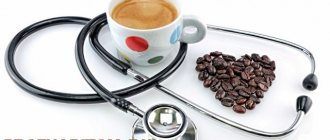Testosterone is a vital sex hormone that affects muscle strength, facial hair growth and genital development. In an effort to avoid substances that can reduce androgen levels, some men, especially athletes, avoid caffeine, but it appears that it may actually increase levels of this hormone. Recently, several studies have been conducted that show how coffee affects testosterone in men.
Testosterone value
Testosterone is the primary male sex hormone produced by the testes, but it is also produced in a woman's body in the ovaries and adrenal glands. Men's bodies produce about 7 mg of testosterone, which is more than 20 times the amount in women.
The hormone helps increase bone density, improve muscle mass and strength, aid in red blood cell production, and play a role in sperm production and sex drive. A decrease in sex hormone levels with age can lead to a decrease in sports and sexual activity.
Opinion of domestic media and doctors
We often hear that coffee has a negative effect on androgens, and there are articles where it is called a “sperm killer.” Men are intimidated that their favorite drink can cause them to develop breasts and lose their libido. But in reality this is not the case at all. In very large quantities, caffeine can increase the amount of cortisol, the stress hormone, which reduces the production of the sex hormone, but few people consume pure concentrate in such quantities. This is just a theory or laboratory tests that for some reason are perceived as a real fact.
A common cup of coffee a day for many will not only not reduce, but will also increase the amount of sex hormones, which has been confirmed by foreign studies on groups of volunteers.
Androgens and sport
Caffeine taken during exercise has a striking effect on androgen production.
Study #1
Professional rugby players were given caffeine supplements in doses ranging from 200 to 800 mg an hour before lifting weights. Results published in the International Journal of Sports Nutrition and Exercise Metabolism in April 2008 showed that strength training without a stimulant caused a 15% increase in male sex hormone concentrations, while strength training with a dose of 800 mg resulted in a 15% increase. 21%.
On average, taking 4 mg of caffeine per kilogram of body weight increased testosterone by more than 10%.
Study #2
This study, published in the European Journal of Applied Physiology, examined the effects of chewing coffee extract gum on fatigue and hormonal response in cyclists.
Volunteers were given either 240 mg of caffeine gum or a coffee-flavored placebo. The performance of those who took the stimulant improved by 5.4% and fatigue was delayed. But more importantly, testosterone increased by 12%.
Caffeine benefits athletes by increasing androgen production, helping to train more actively and perform more strength exercises. Even with increased cortisol levels, it works!
The effect of coffee on testosterone in a man's body
Coffee affects the health of the body. It can change levels of hormones, cholesterol, sugar and other blood components.
Related material: The effect of coffee on the blood vessels of the brain
Testosterone value
A man’s body produces a huge number of sex hormones, but testosterone is considered the most important. It is important to keep it in normal condition, because both increased production and decreased production lead to a deterioration in the functioning of the male body. An increase in testosterone is a common cause of changes in appearance for the worse, as well as the onset of problems in the reproductive system. This can also lead to the formation of tumors, and therefore to oncology. A man can also become infertile, and there is increased hair loss that cannot be stopped on his own.
A reduced level of this sex hormone leads to deterioration or complete loss of erection, as well as other severe sexual problems, which are often faced by men who are inattentive and without due responsibility for their own health. Prevention is the best treatment, so you need to carefully plan your diet. Does natural or instant coffee drink affect testosterone index in men?
What happens if you drink coffee with low and high levels of the hormone?
For quite some time now, men have been concerned with the question: does traditional coffee affect testosterone? At the moment, there are several theories among scientists about how coffee can affect testosterone levels in men. Numerous scientists claim that coffee drink significantly reduces the production of male sex hormone.
This is interesting: When is the best time to drink coffee for health benefits?
In various studies conducted around the world, it was found that caffeine destroys the testosterone produced in the body of men. Caffeine is quickly destroyed in the body, so it is impossible to reliably answer the question: does strong coffee affect testosterone levels in men so seriously as to cause health problems? Three cups of strong coffee drink regularly helps increase the hormone index.
Androgens and reproductive function
Coffee can affect sperm quality and quantity, both of which are controlled by androgens. One study, published in a 2008 issue of Human Reproduction, looked at the adult sons of mothers who took part in a long-term study and consumed caffeine during pregnancy. Mothers who drank four to seven cups a day gave birth to sons with little to moderate androgen levels. But adult sons who drank more coffee had testosterone levels 14 percent higher than those with low intake of the stimulant, although there were no significant differences in sperm quality or volume.
According to research, if a mother consumes a lot of caffeine during pregnancy, the amount of androgens in the child will be low to average. But those children who grow up and drink a lot of coffee raise their levels of this hormone.
Testosterone Boosting Products
Now let's talk about foods that, on the contrary, increase testosterone production in the body. Accordingly, all men who suffer from a lack of testosterone should add these products to their diet, because the amount of this hormone in the body depends on nutrition.
Seafood
Almost all seafood contains large amounts of vitamins A, E, as well as omega-6, omega-5, and zinc acids. All these substances have a beneficial effect on a man’s potency and increase testosterone in the body. Fish also contain a large amount of protein, which is useful not only for potency, but also for human vision. They reduce the risk of cardiovascular disease. Among all seafood, it is worth highlighting oysters, clams, herring, crabs, perch and shrimp. They are distinguished by a large number of useful substances for male potency.
Seafood is best consumed baked. You can also steam fish along with vegetables. This way the fish will retain all its beneficial substances. We recommend consuming seafood no more than 3-4 times a week.
Fruits and vegetables
We all know about the beneficial properties of vegetables and fruits. They contain a huge amount of vitamins and nutrients that increase the body's immunity and protect against various diseases. They can also significantly increase the amount of testosterone in the male body. Among the healthiest vegetables, it is worth noting cabbage, carrots, beets, onions and parsley.
The beneficial substances contained in fruits and vegetables destroy cholesterol, thereby reducing its level in the blood. Also, regular consumption of fruits normalizes blood sugar levels, reducing the risk of developing diabetes. Fruits such as grapes, pineapple, pear, apricot, currants and lemon are distinguished by their beneficial properties for potency.
When choosing vegetables and fruits, always pay attention to their color: they should have a bright, rich color. This means that the product is fresh and contains many useful substances.
Spices
These are red pepper, onion, garlic, turmeric, curry. Among them, garlic is the most effective. Despite its pungent odor, which most often repels others, it is actively used to maintain healthy potency. Garlic is most common in eastern countries. And as statistics show, there are no problems with the birth rate there. Therefore, add garlic to various dishes, such as salads, meat or fish dishes, and so on.
- about the author
- Recent publications
Mikhail Zaitsev
Mikhail Zaitsev recently published (see all)
- The duration of Viagra is 04/16/2017
- What analogues of Dapoxetine exist? — 03/16/2017
- Coffee and other products that lower testosterone levels: how to protect the body? — 03/12/2017
The influence of natural and decaffeinated coffee
And another study: the Nutrition Journal looked at the effect of coffee on the hormonal system. The project involved 42 overweight people. Some of the group took natural black coffee, some took decaf, and others did not drink coffee at all. Among men, consuming caffeinated coffee increased total testosterone; decaf had no effect, so the results were comparable to the group that did not drink caffeinated drinks at all. However, the groups were quite small, so it is difficult to project the results onto mass indicators.
How does the body react to drink abuse?
Abuse of the drink not only negatively affects hormonal levels, but can also lead to the following problems:
- persistent increase in blood pressure, and this is the risk of developing hypertension in men over 40-50 years old;
- disruption of the gastrointestinal tract (especially in chronic diseases of the stomach, intestines, and liver);
- mood changes, depression, apathy;
- insomnia;
- caffeine addiction;
- risk of developing osteoporosis;
- migraine, short-term headaches;
- problems with sugar and insulin levels;
- reproductive problems;
- skin aging;
- adrenal fatigue;
- disruption of the liver and bile ducts.
Please note that this is only a part of the possible disorders and pathologies!
Watch a video about the dangers of coffee if you abuse this drink:
testosterone
Don’t think that the more of your favorite espresso you drink, the more androgens will be produced. In this case, everything is somewhat the opposite. Large amounts of caffeine produce large amounts of cortisol, and when there is too much of it, you will not be able to rest properly. Deep sleep helps to produce all the hormones, so it is not recommended to drink a stimulating drink after 17-18 hours, and drink only 2-3 cups per day. This way you will not harm yourself, and you will be able to increase the production of a hormone important for the male body.
Conclusions:
- Coffee actually increases testosterone levels when consumed regularly.
- The hormone helps muscles grow more actively, controls facial hair growth and affects male strength. Many athletes drink caffeine before training, and male sex hormones help them exercise more actively, increase strength and endurance.
- Only natural coffee matters; decaf has no noticeable effect.
- Very large amounts of caffeine increase cortisol levels and decrease testosterone levels, so you should not drink more than 4-5 cups of your favorite drink per day.
Decreased testosterone levels – is it your doing?
Very few bodybuilders pay enough attention to understand what testosterone is and why testosterone levels can suddenly drop. Today I will tell you what everyday habits affect the decrease in testosterone levels and how you can bring it back to normal.
It is difficult to imagine another topic that would cause as much controversy, disagreement and different opinions as testosterone among bodybuilders. In the gym, you can often hear discussions about what exercises, sports nutrition, medications or herbs may or may not magically increase testosterone production.
The entire bodybuilding culture is focused on exercises, programs and products that naturally increase testosterone levels. Despite this, it is already becoming the norm among practicing doctors in the sports field to prescribe testosterone replacement therapy to almost every older man.
But let's go back to the basics and figure out why testosterone is so important for athletes and what factors lead to a decrease in its production.
Aging is not the main reason
Testosterone production in the human body is regulated by the hypothalamic-pituitary-adrenal (HPA) axis, which controls the functioning of our endocrine and metabolic systems. In both men and women, the hypothalamus sends signals to the gonads to produce testosterone.
Although many people believe that testosterone production declines primarily during the aging process, there is currently no research to support the hypothesis that aging is the primary cause of decreased testosterone production.
Research indicates that normal testosterone levels decline significantly from generation to generation. For example, a 2007 study published in the journal Clinical Endocrinology and Metabolism noted that average testosterone levels in American men decreased by 17% from 1987 to 2004. If this decline is not related to aging, what is the reason?
Factor 1. Harmful effects of the environment and free radicals
The testes in men and the ovaries in women are extremely sensitive to both internal and external factors affecting the body. A decrease in testosterone production by the testes or ovaries is provoked by the presence of reactive oxygen species in the body. These "active forms" are molecules that the body produces in response to stress from external stressors (toxins and pollution) and internal stressors (waste products produced by intense exercise).
Of course, you shouldn't give up the workouts that help you improve your health and stay in shape, but you can try to minimize the destructive effects of environmental factors and toxins. Keep in mind that alcohol, cigarettes, medications and antibiotics, and even chemicals used in manufacturing and found on the surface of plastic food containers can cause a drop in testosterone levels.
Factor 2: Increased cortisol production reduces testosterone levels
You might think that going to bed late on a regular basis a couple of days a week isn't such a big deal, but over time, poor sleep can play a trick on you. Just one night of poor sleep triggers an increase in the production of cortisol, a catabolic hormone that breaks down muscle mass. Research has demonstrated that increased cortisol production can lead to decreased testosterone levels.
Physical stress also affects hormone levels. In particular, overtraining directly affects the increase in cortisol production, so you are mistaken if you think that the more you exercise, the greater the benefits for the body. In fact, exercising too intensely or for too long will lead to low testosterone levels.
Regulating the optimal load, duration and intensity of training is the easiest way to reduce the load on the body and prevent a decrease in testosterone levels.
Factor 3. Excess body fat and fluctuations in blood sugar
Excess body fat interferes with the normal functioning of numerous hormonal systems, which ultimately leads to decreased testosterone production. Elevated blood sugar levels, both from short-term harmful snacks and from long-term overeating, increase the activity of the enzyme contained in adipose tissue that converts testosterone into estrogen.
There are numerous real-life examples of scenarios in which such estrogen imbalance negatively affects the body's hormonal balance. For example, people with normal testosterone levels but elevated estrogen levels often suffer from decreased testosterone production. As the estrogen load decreases, testosterone production returns to normal levels.
The easiest way to control the occurrence of hormonal imbalance is to get rid of excess fat and avoid overeating. The best way to do this is to follow a low-carb diet, which will help you gradually reduce your body fat stores.
Factor 4. Normal functioning of the liver and digestive system
Normal functioning of the liver and digestive system is a prerequisite for optimal testosterone production. Excessive food consumption leads to imbalanced hormone levels and weight gain, and also puts additional stress on the digestive system, which is one of the key regulators of the body's overall health, and the liver, the main detoxifying organ.
In addition to the stress of overeating, many common foods can have an inflammatory effect on the digestive system. Immunogenic foods such as corn, soy, gluten, dairy, and in some cases eggs can trigger intestinal inflammation. Alcohol and prescription drugs can also cause inflammation of the stomach and liver.
Most hormones are produced in the gut, so stress and inflammation in the digestive system directly affect hormonal imbalances. In particular, liver inflammation, digestive problems, or leaky gut syndrome can lead to low testosterone levels.
If the digestive system is not functioning optimally or liver function is compromised due to bad habits, unhealthy lifestyle or stress, the body cannot produce hormones in a balanced manner. For this reason, there are problems with eliminating and reducing the concentration of toxins that act as inhibitors and affect the decrease in testosterone levels.
How to increase testosterone levels
There is no instant way to effectively increase testosterone production. In any case, hormonal balance is a serious matter, and with any attempts to influence the production of individual hormones, think, first of all, about the health of your body as a whole. The five recommendations below will help you gradually normalize your overall hormonal levels and optimize your testosterone levels.
1. Minimize the harm of toxins in your daily life. Reduce alcohol consumption, stop smoking, and avoid using plastic containers.
2. Healthy sleep is important. Follow a routine, ventilate the bedroom, fall asleep in the dark, half an hour before bedtime, dim the lights, turn off the computer and put away the phone.
3. Find ways to relax a little during the day. Get a massage, do yoga, or simply do breathing exercises. Reduce physical stress by reducing your overall training volume and intensity.
4. If you have problems with excess weight, it is recommended to reduce your carbohydrate intake and minimize your intake of gluten, corn, soy and dairy products. Include more sources of healthy fats in your diet, such as olive oil, coconut oil and Brazil nuts.
5. In order to improve digestion and support the body's natural detoxification, it is recommended to increase the consumption of green vegetables, mushrooms and omega-3 fish oil.










